Tandang Store + Alak & Wan
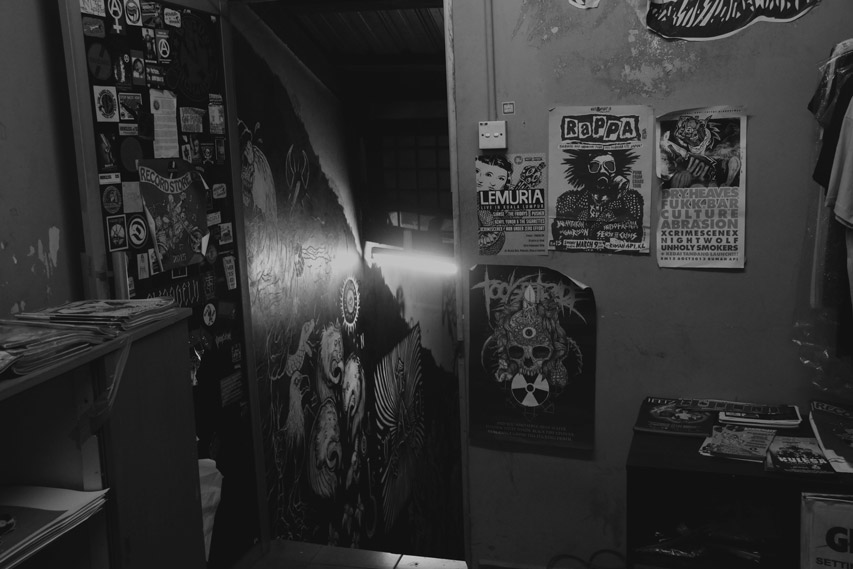 Thirsty for JUICE content? Quench your cravings on our Instagram, TikTok and WhatsApp
Thirsty for JUICE content? Quench your cravings on our Instagram, TikTok and WhatsApp
SHOP
Tandang Store
Record Hub in a Punk Garage
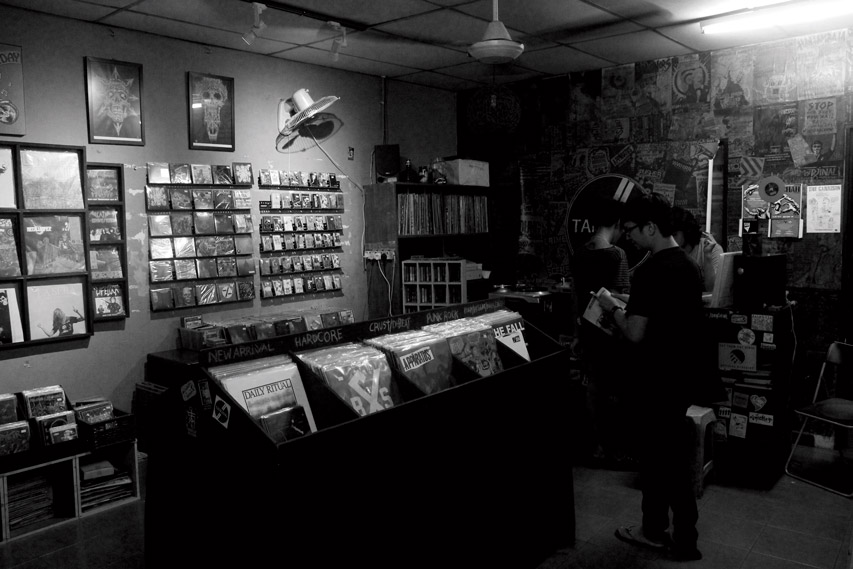
Rumah Api is a gig space that primarily serves as a haven for punk, hardcore, and underground shows. It’s quite the unassuming dingy hole that’s located under a dobby, along a row of shoplots in Ampang. But walking through the black metal door into Rumah Api, past the graffiti walls, a flight of stairs would take you to the entrance of a small record shop called Tandang Store. Just like the unruly venue in which it’s situated in, Tandang Store is stocked with plenty of — but not limited to — DIY titles, from hardcore to indie to post-rock. Aside from vinyl, cassettes, and CDs, the record shop also sells consigned merchandise from Bogus Merchandise (silkscreened t-shirts) and Pustaka Semesta, which offers music literature in the form of zines. The owners — Alak and Wan — together with a collective of friends, publish their own zine as well, entitled SHOCK&AWE!. Though the shop is only open on weekend nights and on the occasion of a Rumah Api gig, the owners take mail orders on weekdays. In addition to the shop, Tandang Store is also a record label where they most recently co-released Killeur Calculateur’s successful album Book of Flags.

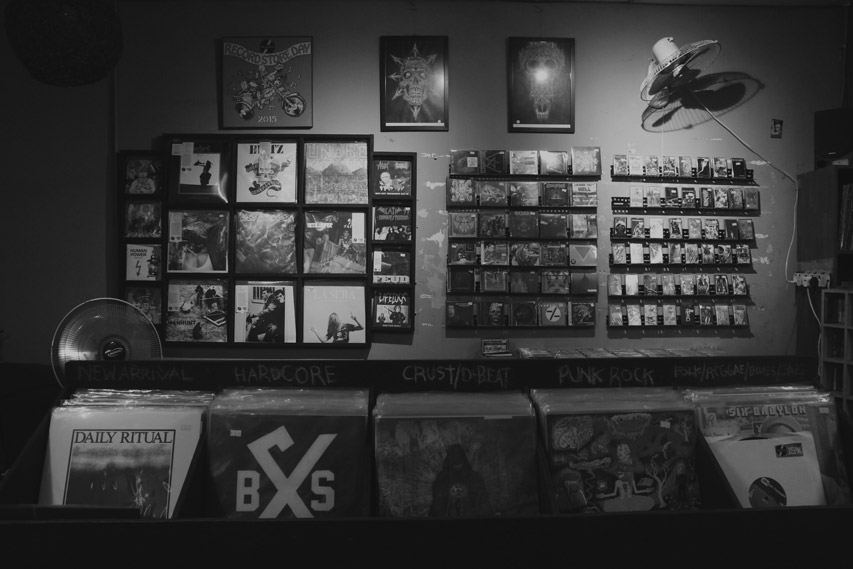
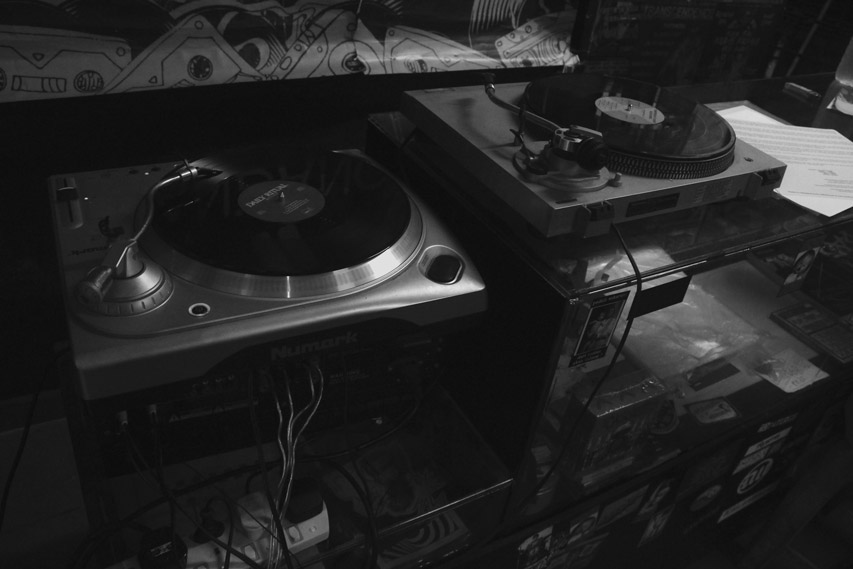
Tandang Store is located on the first floor of Rumah Api at 178, Jalan Ampang, Kg. Baru Ampang, Pekan Ampang, 68000 Ampang, Selangor.
Opening hours are 8pm to 12.30am on Friday, Saturday, and Sunday. The rest of the days are on an appointment basis and dependent on whether Rumah Api is holding a gig.
facebook.com/tandangstore
instagram.com/tandang_store
cactuslist.weebly.com
OWNERS
Alak + Wan
More Than Just Leisurely Proprietors
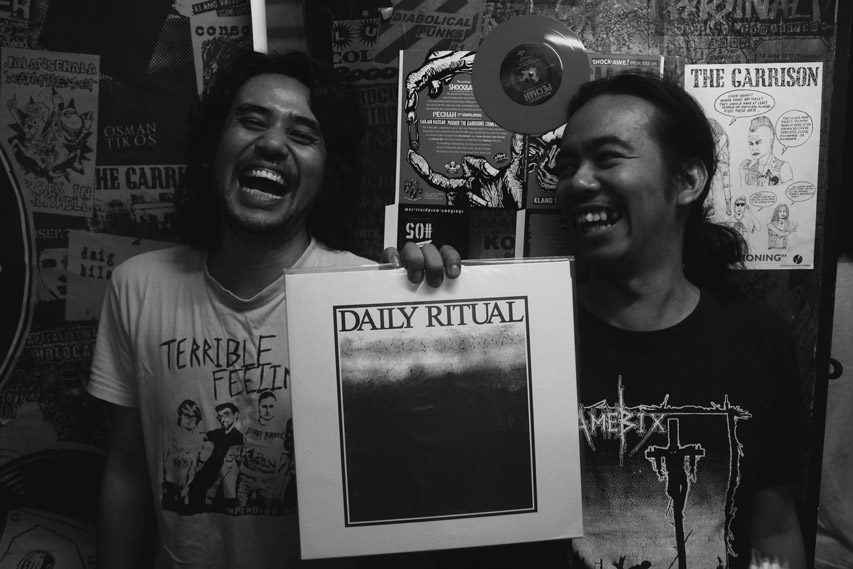
Individually, Alak and Wan both had their own DIY labels — Knot Records and Cactus Records respectively — before they finally merged together to form Tandang Store and the record label of the same name. While they both maintain freelance day jobs, that did not deter them from setting up a small hub for likeminded people and friends to converge and buy reasonably priced records as well as hanging out for a barbeque at the back of the store. Even though they may have a laidback demeanour about them, you can trust that the both of them are very astute about the business in which they’re involved in.
How did you guys get into the record store business?
Wan We started in early 2000 after school, we were from the same college. [We had] matriculation in 1999, but we did things separately [at the time]. Both of us managed our own DIY record label. He was staying in Shah Alam and I was staying in Serdang, but we always met each other because we did the same thing. So then, Rumah Api opened in 2007 under the name Gudang Noisy and they changed everything. At that time we had to bring our distro stuff and just laid it on the table or floor to be sold. Things got better between us because we were part of the SHOCK&AWE! zines.
Alak It’s a platform where we write, but now the editor Yuen is posted in Sarawak, so the zine is going pretty slow now. But yeah, we do everything ourselves, we take pictures, we do the shows, etc.
W Issue #5 was the start of the collaboration between me and Alak. That particular issue comes with a 7-inch vinyl compilation called PECHAH that features four bands revolving the Rumah Api and Lembah Klang scene circa 2012. And we frequently come to Rumah Api because there is a lot of shows there. So we always bring the stuff to be sold at the show. And one day we found out that the room space upstairs was suddenly empty.
A Somebody was living here, renting it as a room.
W We thought why not we open a record store with a weird name.
A Somebody suggested using the name Balai but we decided to go for the name Tandang, which means welcoming or coming.
W Yeah, like, mari bertandang.
A Old people use this typical phrase on places where teenagers loiter and hang out…“Tempat jin bertandang” – Ghosts come to bertandang.
W It’s a very old word. But we have another story for [the name] Tandang actually (laughs). There’s an obscure drinking shop which also sells exotic delicacies like Wild Boar or Biawak at Jalan Tandang, Petaling Jaya. A lot of people will buy drinks and hang out at the park nearby. So Alak said, “Eh, nama Jalan Tandang macam best, ye?” So we got a shop, namanya Tandang Store. It means datang or welcoming. So, after we opened, many people went, “Nanti kita bertandang ke Tandang.” It has a nice rhyme to it.
We know you guys get the shop’s stock from everywhere — i.e. Svart Records from Finland and recently, Ebullition Records from the States. How is the process like?
W Svart and Ebullition are two different things. Svart is only a label, a single label that releases all the good Scandinavian stuff. Ebullition is the hub of all American DIY stuff. In the mid ‘90s, semua orang tak suka all these exclusive distributors. But they also didn’t like mainstream distribution like EMI taking over all these stuff, so Ebullition is a nice hub and Ken is a nice guy… that time, CDs can be traded with LPs but now not anymore. Now you have to take wholesales from foreign labels and bear with the shipping cost and everything. So, Ebullition is a Mecca for all things DIY and problems with exclusive distributions is not an issue anymore recently.
A A lot of small labels and bands would place their releases at Ebullition.
W … only DIY distribution. But I think Ebullition and Svart are two different entities, but the basic deal is simple—we just say what we like and then belilah! But now it’s really crucial because nowadays records are not cheap, so you have to understand what you want to take and you have to see the market (laughs). We know our friends who always come here, so we know what people like.
A But mostly, what we do is we see cater to what we both like, because if you wanna follow the market and the trend, a lot of things are getting crazier and more exaggerated without any substance. Major labels which were dying in the late ’90s due to the rise of digital formats are coming back to manipulate and capture the trendy culture of analogue-listening today. They are repressing almost everything without any control. The only good thing mainstream labels are doing is putting some rare releases back on vinyl, but other than that they are actually degrading the quality by pushing the quantity too much and marking up vinyl to unreasonable prices.
W But Svart is just a record label, like Cactus, like Knot. In Europe, there’s a lot of hubs like Ebullition that we deal with too. We take from Svart, but we sometimes take from labels such as Nuclear Blast—a metal label—because they have a lot of good titles, maybe like 50 good titles… To deal with the bands or label that only sells two to three titles is quite hard because small quantity purchase means that you have to bear the higher shipping rate, so there’s no point, it’s better we go to Ebullition because they have a lot of titles and we can take lots of stuff in bulk, shipping is not cheap, you know.
W But in the process of doing this record store, we dig everything that’s good. So, in the process we always find the best deals to keep the vinyl cheap.
You guys once said that your clientele are more of the cassette-buying sorts (shout out to Azzief). Did you guys find that surprising?
A It’s quite shocking because [in 2014], vinyl was booming. [2015], cassettes are selling good.
W Small kids—18, 19 years old—yang tak banyak duit tu are [buying the cassettes]. Vinyl [records] are for those who are working. When we look back at the accounts, banyak cassettes yang lebih banyak jual because it’s RM8 and [a single] LP is RM65 – it’s better for the kids to buy the cassette.
A The problem is, in the States or in Europe, vinyl [records] are affordable, it’s for everybody. Like, the most expensive one is USD15. But here, it is like RM65…
W But I think it’s good lah here, because we sell a lot of vinyl too, because we sell it cheap. And, vinyl comes and goes, comes and goes… We feel happy about it too. People also keep complaining to us, “Why do you sell so cheap?”
A And we have friends from Europe who buy from us and we ask them, “Why don’t you buy it from there?” They say it’s almost the same price.
W So that’s one of the things that we’re proud of. You want to listen to music and not to make it exclusive.
You guys are not capitalists?
A No, we’re capitalists.
W (Laughs) Idealistic!
No, that’s a joke because we interviewed these artists who own a studio and they are providing cheap classes; they made a joke about not being capitalists.
A Yeah.
W I think that’s a good point because punk’s ideology is like, “Fuck capitalists!” When you got the rhyme of not being capitalists and being good to who you serve, I think it’s good.
A For us, of course we make money, but we’re not selling our goods to an exclusive extend til some people can’t afford to buy and listen to music. Music is to be shared. It’s like if you [priced] RM100 per LP, which actually costs like RM50 [or] RM40, then how can you say music is for everyone? Again, of course we make a bit of profit, but we don’t want to exploit the situation and take advantage of our customers.
So why did you guys decide to open it here? Maybe you could place the store somewhere more accessible?
W Actually, when different kinds of customers come, it’s not them who are shocked, it’s us! Like, “How did you know about our shop?” (Laughs)
A The early plan was because Rumah Api does shows, so [there would be walk-in customers]. And, Rumah Api is where we spend most of our time. We thought of opening in the middle of town, but in the meantime, this place is sort of our training ground. We don’t have that much money to open a shop in town yet, but there are future plans.
W Actually, this is more of a leisure, pleasure thing because Alak and I, we have day jobs too. We don’t mind opening our store on the weekends.
Is it hard to get cassette releases?
A We release our own cassettes actually. There’s only one place in Malaysia where you can press cassettes and that’s in Maluri.
W All the good bands start with cassette demos.
A They will start with a demo tape and give it to a gig organiser or record labels as an introduction and then start blooming from there on.
W We still do it but not so much anymore, but whatever that can’t be pressed on vinyl, we do it on cassettes. Very cheap and reliable. We have five releases; three cassettes, one 12-inch vinyl, and one 7-inch. We are only two years old and we have five releases, we don’t want to do CD in the meantime because we think… (laughs).
A The sales of CDs are not that good, it’s more digitalised. But it depends on the title and how good the release is. Well, everybody can do CDs, but it’s a matter of how good it is then.
W You have to be a really, really good band to sell your CDs, kalau tak, jadi pekasam lah. The trend of analogue is booming now.
Since pressing your own vinyl is so costly, how do you guys maintain the inexpensive pricing?
A We sell foreign titles, some of the profit from these titles; we use to fund our releases on tape or vinyl.
W We want to grow Tandang Records. We want to support our circle of friends who come here and barbeque with us, become friends with us… But if we don’t grow as a business, we can’t manage to do that, so that’s why this store is a very, very good platform for us to enrich the record label.
A And Malaysia is so small, our circuit consists of the scenes from Singapore, the Philippines, Indonesia…
W The DIY scene is very connected. It’s not like a secret society, it’s very organic. So when we have Tandang Records, all the punks in SEA said this is such a good thing, they really want to come over one day. We feel very honoured because of it. When we released Killeur Calculateur’s album, it was the best experience. The first day, 30 people we’ve never met showed up and it sold in two weeks.
How do you guys determine the price point for the vinyl?
W Not too much profit.
A We always look back at ourselves because we’re consumers too.
W That’s the problem of owning a record store and being a collector too (laughs).
A So we look at ourselves, like as if we were kids, how much would we pay? Is it worth to save my money for it? Or is it worth the price?
W We are focussing on our own releases to make some money because that’s our main source of activity. These records are just on the side.
Are you irked by kids or whomever who buy vinyl for their aesthetic, nostalgic appeal and not for the quality of sound?
A To be a collector for the aesthetics is a personal choice. But surely music pressed in analogue and physical formats are the best in terms of quality and archiving. When you’re in a band, that’s the whole satisfaction package. Like me and Wan, we play in a band as well… It’s like a dream for every band, you want your songs to be recorded and to be listened and be shared, and the best way to do it is by pressing it in a physical format with good quality of sound so people who buy your release would be satisfied and cherish it rather than cursing you after buying and listening to it.
W Vinyl now, it’s not [exactly] the ‘in’ thing but it’s superior.
A But we’ve never stopped, it may be the ‘in’ thing for some people but we’ve never stopped liking and listening to analogue formats like vinyls and tapes.
W The point is why vinyl is better than CD? Sometimes vinyl can be shit.
A Depends on who you listen (laughs).
W Like we sent the mastering job to a guy in the States, because we wanted it to have an analogue output. It’s quite expensive though but I think that’s the necessity of doing vinyl because we can’t find a guy who can do mastering [for vinyl] here. They can, but maybe the output would still be digital and it cost a lot more, because of the lack of facilities and equipment. Why would you want to do a vinyl release with shitty quality?
A Because we spend a lot on everything, like the shipping and everything. We might as well have good output.
W Like now, it’s the dream now to do vinyl among the kids here.
A I think it’s the best material to archive your music because you see like the ‘40s, ‘50s, if you take care of it, you can archive it and keep it for a long time. Like even for cassettes, it can get fungus and you can break the tapes. Vinyl is better and preferable…if you take care of it. You just have to wash it and make sure it doesn’t get any scratches.
W Depends on you lah. If you wanna do it as a trend or jump on the wagon, that’s your choice. For us, that’s our learning experience. It’s expensive and not easy and it cannot be done most of the time. So when we release something, we discuss if this should be released on vinyl or not? “Oh, this band is good enough.”
A We’d test first on tape.
W But that’s based on our discussion on the bands. Like Killeur Calculateur, that band is ready enough for vinyl, like The Garrisons, we prefer to release their recent EP on cassette.
What other projects do you guys have in store for Tandang Store and the record label?
A Another 12-inch LP for The Bollocks, a punk band which started from the early ‘90s. They’re still playing though and getting much heavier and better. They are quite big in the DIY/HC/punk scene.
W But that was the first band that has a vinyl release too. The Bollocks in ’95.
A 7-inch.
W The first punk band in Malaysia to be released by a French guy who digs out bands from obscure or exotic countries. He also releases bands from Kazakhstan, Myanmar, Laos, etc…
A The release is called My Friend. And we’re also coming together with The Wknd Sessions and Basement Records—it’s a small record shop—we’re thinking to open a small hub in the city, maybe in Bangsar.
W We’re merging with them.
A But we’ll still maintain Tandang.
W And that time, we’ll open the shop everyday (laughs).
[email protected]
[email protected]


 Get Audio+
Get Audio+ Hot FM
Hot FM Kool 101
Kool 101 Eight FM
Eight FM Fly FM
Fly FM Molek FM
Molek FM